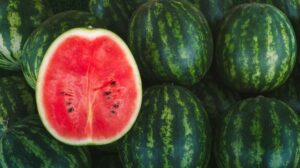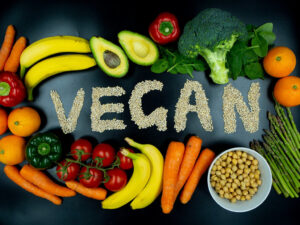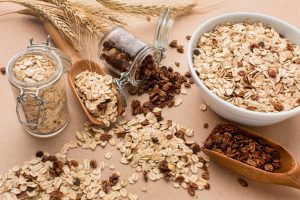 Hey everyone. This week has been really busy, with a test coming up and a few projects. I wanted to write about pesticide use on plants, how much is removed from washing, the dangers of ingesting pesticides, etc., but would need more time to thoroughly research this very dense topic. I decided to write up something easy and quick and save the pesticide blog for next week. I picked celiac disease and gluten-free diets since this seems to be an area of great confusion to most.
Hey everyone. This week has been really busy, with a test coming up and a few projects. I wanted to write about pesticide use on plants, how much is removed from washing, the dangers of ingesting pesticides, etc., but would need more time to thoroughly research this very dense topic. I decided to write up something easy and quick and save the pesticide blog for next week. I picked celiac disease and gluten-free diets since this seems to be an area of great confusion to most.
What is gluten?
I guess a good place to start would be to tell you what gluten is. Gluten refers to the proteins found in wheat products. Gluten is just another protein. Gluten gives the airy texture to dough and helps bread rise (technically, yeast makes it rise, but without gluten, gas bubbles will not form, so the texture will be denser and less airy). This is why most gluten-free breads are really thin.
Foods that contain gluten
The following wheat-based foods have gluten: cakes, pasta, oats, cereal, crackers, bread, cookies, pastries, beer, gravy, and flour tortillas. Really anything with wheat in the ingredients likely has gluten. Examples of flour containing gluten are: whole wheat flour, white flour, durum wheat, wheat germ, wheat bran, semolina, and spelt.
The difference between gluten-free and gluten-containing foods
In my opinion, gluten-containing foods are likely healthier than gluten-free foods, UNLESS someone has celiac disease. The only difference between the two products is that one has gluten and the other has gluten removed. There really are no “health” differences outside of this. I am not sure why people believe removing something from food would make it healthier. That is like saying lactaid milk is healthier than lactose-containing milk because lactose is taken out (lactose is a sugar that lactose-intolerant people are allergic to). For some reason, people understand that Lactaid is for people who have problems digesting lactose and assign no health benefits to it, while most people do not understand that gluten-free foods are for people with an allergy to gluten and that there are no other health benefits.
Health benefits of gluten-containing foods
This is a quote from Peter H.R. Green, MD, director of the Celiac Disease Center at Columbia University, taken from WebMd.com.
““The market for gluten-free products is exploding. Why exactly? We don’t know. Many people may just perceive that a gluten-free diet is healthier.”
In fact, it isn’t. For people with celiac disease, a gluten-free diet is essential. But for others, “unless people are very careful, a gluten-free diet can lack vitamins, minerals, and fiber,” says Green.
While wheat is not needed in your diet, it is full of vitamins, minerals, and fiber. Wheat is a good source of phytochemicals (chemicals in plants besides their vitamins and minerals, which may prevent disease). It is relatively cheap and pretty filling. Most of the breads on the market are not whole-grain wheat. If the bread has more than three or four ingredients, it is probably so processed that it is hardly worth eating. Whole wheat products should contain whole wheat flour, water, salt, and maybe one acid.
What is celiac disease?
Celiac disease is an auto-immune disorder. This means that the body mistakenly attacks itself, believing that there is a foreign invader trying to hurt us. Celiac disease is a genetic disorder, meaning that you are born with it, although one can certainly develop an allergy to any food over time. When gluten enters the intestines of people with celiac disease, their bodies begin to attack it, which causes inflammation. This attack damages the villi in the intestines. The villi are responsible for absorbing nutrients, so when they are damaged, people become malnourished. This is a serious problem and can cause anemia, lack of growth, weight loss, infertility, seizures, birth defects, and osteoporosis, to name a few.
People who have celiac disease are hypersensitive to gluten; even miniscule amounts will result in the body attacking itself. If you suspect you have celiac disease, the doctors can perform a test to determine if you have an allergy to gluten. This is the best way for you to find out. If you plan on going for a test, continue to eat wheat as you normally do. If you cut wheat out of your diet and go get a test, it may not be accurate. If someone with celiac disease is never diagnosed and continues to eat gluten their whole life, the damage to the intestines can be so severe as to require an IV feeding tube to receive nutritional supplements.
Unfortunately, there is no cure for celiac disease. The only cure is to never eat gluten again. Strict avoidance is essential, as even very tiny amounts can cause a reaction. Be aware that a lot of gluten-free pizzas from pizzerias are likely cross-contaminated with wheat products, so be careful when eating out, as most restaurants likely do not understand how sensitive people with celiac disease are.
Percentage of people with celiac disease
With all the hype around gluten-free diets, one would get the impression that celiac disease is becoming more common in Americans. The fact is that only about 1% of Americans have celiac disease. Or, if you prefer, about 1 in 133 people will have celiac disease. With these odds, it is unlikely you, or anyone you know, have celiac disease.
Wheat alternatives
Unfortunately, wheat is in most products, so avoiding it is very difficult. It is cheap and abundant, so companies put it in almost everything. Living a truly gluten-free lifestyle is difficult, which is why I wonder why people who don’t have celiac disease would put themselves on such a restricted diet.
Fortunately, many companies and food establishments are offering wheat alternatives. Some healthy gluten-free alternatives to wheat include quinoa, brown rice, corn, wild rice, buckwheat, and amaranth. These are all really healthy substitutes with fiber, vitamins, minerals, and phytochemicals, and they are relatively inexpensive. Since quinoa is gaining in popularity, the price is going up. I have heard that it is cheaper at stores specializing in ethnic foods. While these foods are easy to find and make at home, going out to eat may still be an issue.
Expensive
While grain alternatives like rice and quinoa are pretty cheap, specially made breads and processed foods that are labeled gluten-free tend to be costly. It would probably be cheaper and healthier to stick with mostly grain alternatives like brown rice and quinoa and eat gluten-free breads and gluten-free processed foods less often.
Conclusion
The point of this blog is not to bash gluten-free diets. After meeting so many people who claimed to eat a gluten-free diet but had no idea what celiac disease was, I felt the need to clarify why one should follow a gluten-free diet because one has an allergy and why one should follow a gluten-free diet because one thinks that wheat is not healthy. For some reason, the mention of the word wheat evokes a lot of emotions in people. Many people swear that wheat is an evil food that man was not meant to eat and that is forced onto us because powerful corporations control its production. Maybe this is true. I really don’t know, though.
There are known health benefits to wheat, as I have already discussed. But wheat is by no means an essential part of the diet. If someone would rather not eat wheat, then I respect their choice. Although I consume wheat, I really feel no attachment to it. If I knew of evidence showing it was bad for us, I would stop eating it.
Fortunately, a majority of the studies I have read in the past have shown that consumption of whole grain wheat products is actually associated with lower rates of heart disease and cancer. So whether or not we were “meant” to eat wheat, I do not know, but I do know that studies show it has health benefits. The paleo diet discussion will be saved for another time, however, as that topic alone is worth dedicating a blog to.
Final thought: if you have celiac disease, absolutely stay away from wheat, as it can cause permanent damage to your intestines and increase your risk of malabsorption of vitamins and minerals. If you do not have celiac disease and eat gluten-free because you heard it is healthier, please do your own research. Many people will tell you they are cured of an array of illnesses, have more energy than they ever had, and just feel all around better once they cut out wheat. While I am sincerely happy that they feel great, anecdotal (personal account) evidence is the most unreliable type of evidence, and there is a reason it is not taken seriously or used at all in scientific research.




This article is very good; very informative; and as I mentioned on my previous comments, really like reading your opinion.
este tema me encanto porque supe exactamente los alimentos que contienen gluten
ahora como se da cuenta uno de que le hace daño los alimentos que contiene
esa sustancia
Tambien Rob te da opciones de que alimentos no contiene gluten… como arroz integral y quinoa.
si quinoa es muy deliciosa! Eso es mi favorita comida para sopa! Tambien arroz marron es muy sano. pero wheat esta bien para mas personas. Puede comer maiz tambien! Gracias para leer!
Thanks, I am glad you enjoyed it!
Thanks Lucia!!
Very interesting topic….I guess this opens me the door to read more about “gluten”, since we don’t have much literature here.
Nice reading you again !
Welcome back! Gluten should not be a problem for you unless you have celiac disease which is unlikely. What are more common in Guatemala, corn or wheat tortillas? I prefer corn. If you eat mostly fruits, vegetables and corn based products you probably do not eat much wheat anyway
I really liked and enjoyed this article and think its important that people really know what gluten is and the reasons to avoid it. It seems that being gluten free has become a the new health thing, but most people don’t understand it. Looking forward to your article on paleo!!
Hey Erica. Celiac disease is a serious illness and it is unfortunate that our society has turned eating gluten free into a new health fad and caused confusion about how gluten free diets started. Most people that I have met that eat gluten free were not aware of celiac disease or even health benefits of eating a gluten free diet. I will let you know when I get around to talking about the paleo diet…I really do not know much about it just the general idea so I am looking forward to learning about it!